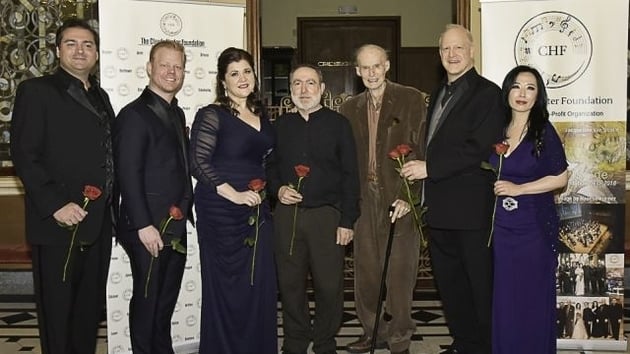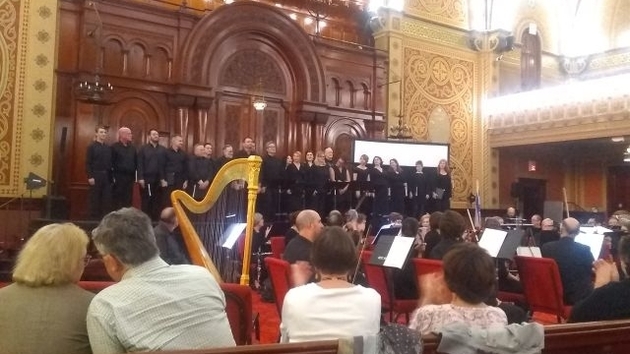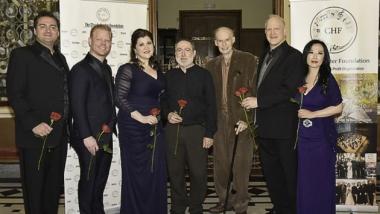
Verdi’s 1841 Nabucco was the composer’s third opera and first success.
Claude Heater Foundation’s single-performance production of Nabucco on Oct. 20, 2019, was the organization’s second offering and second success.
Following the fearless beginning of the organization’s life with Wagner’s Tristan and Isolde, Foundation Executive Director Juyeon Song produced the opera about ancient Babylonians and Hebrews in a temple — likely to be the first such event in Nabucco’s 178-year history — advertised as “opera with a tale of Jewish people presented in a Jewish temple.”

The venue turned out to be important beyond the symbolism: not just any temple, the Sherith Israel is a magnificent, historic building with a grand sanctuary. The size is amazing, and while the numbers — 120 feet high, 20,000 square feet of interior space — may not mean much, consider that the sanctuary is similar to the massive dome of San Francisco City Hall. (An apt comparison as the 1905 temple survived the Big Quake in the following year and was used as the city hall, replacing the destroyed one on Van Ness.)
Given that size and — glory be! — no amplification, how did this concert performance sound? Amazingly good. With Jonathan Khuner conducting the large orchestra and small but mighty chorus, the soloists lined up in front of the Ark (in Hebrew, aron kodesh), the sound streamed into the hall, surprisingly coming back from the far-away roof of the sanctuary in its full glory.
Khuner was, as usual, self-effacing and in complete control, maximizing Verdi’s exciting rhythms, but giving equal weight to lyrical elements in the score, not allowing marches and crowd responses — from the group of 17 singers that channeled a much larger chorus — to push everything else to the back.
This balance also figured prominently in the singing: beyond Song’s power and high notes in portraying the evil Abigaille (an anti-hero presaging Verdi’s Lady Macbeth), her most remarkable performance came with her quiet, sorrowful final aria, “Su me ... morente ... esanime” (“Me ... dying ... lifeless”).

As the initially evil title character, Nabucco, destroyer of Solomon’s Temple, Kenneth Stavert raged (and outraged) well, but when it came to his seeing the light and embracing his former enemies, the baritone’s “Ah, torna Israello” (“Return, Israel”) presented his voice at its best. Even Philip Skinner, as the mighty, booming high priest Zaccaria, had his “quiet moment” to show off pastel colors in that big, big voice.
Tamara Gallo, the passionate Brangäne from the Foundation’s Tristan, sang beautifully the role of the good princess Fenena, who somehow survives the machinations of Abigaille.
Alex Boyer’s Ismaele showed the spinto tenor advancing near to heldentenor domain. Doing double duty as chorus member and the High Priest of Baal, Chung-Wai Soong fit well into the excellent ensemble.

Strangely, and perhaps as a personal quirk from the ear of the beholder, the only slight disappointment came with what is always THE high point of the opera, the Hebrew slaves’ chorus, “Va, pensiero, sull’ali dorate” (“Go, thoughts, on golden wings”), always a show-stopper. It wasn’t this time.

Much thought and work went into finding a Hebrew translation (by David Sebba) of the Italian lyrics, but beyond an A for effort, execution was lacking, both in musical power and anything approaching good diction — which prevailed with most singers’ Italian.
Those in the music business don’t like the term “pickup orchestra,” but when you have a single performance by a small organization, what else would you call the ad hoc musicians? To me, it’s a special badge of accomplishment to assemble such a group and have them perform as outstandingly as these musicians did.
Among orchestral soloists, concertmaster Joseph Edelberg, cellist Leighton Fong, and Stacey Pelinka’s flute obligatos stood out.
Now the question is: what surprise next from Song and the Heater Foundation? Whatever it may be, Bay Area opera fans and those appreciating underdog heroics should look forward to it.




